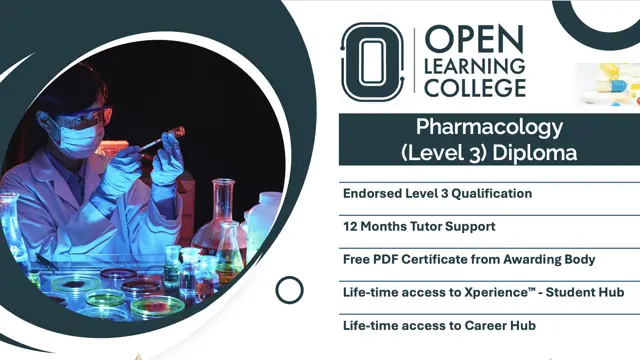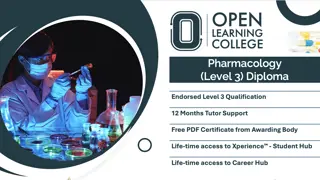
Pharmacology (Level 3) Diploma
Distance Learning Course, featuring tutor support and AI assistance, available online or as a study pack option.
Open Learning College
Summary
Funding options available on our website
- QLS & OPA - Free
- Exam(s) / assessment(s) is included in price
- Tutor is available to students
- TOTUM card included in price What's this?
Add to basket or enquire
Overview
Embark on a transformative learning journey with the UK’s most innovative home study provider, offering courses designed to unlock your true potential and facilitate the career change you desire. Access our distance learning courses directly from anywhere, anytime, and acquire industry-recognised Professional Qualifications essential for advancing in your career.
Specifically, explore the flexible and convenient Pharmacology (Level 3) course, an ideal way to gain a diploma qualification. Whether you aim for further education, improved job prospects, or expanded knowledge, this comprehensive course allows you to prepare thoroughly for exams or careers through home study. Plus, it’s structured to be accessible and beneficial even if you have no prior knowledge in Pharmacology.
Pharmacology involves the study of the effects of chemical substances on the function of living bodies. The subject originated in the nineteenth century as a science, one of many biomedical sciences that were based on experimentation, as opposed to the dogma that existed at that time. Today, modern medicine relies heavily on drugs as a major tool of therapeutics, along with surgery, diet and exercise.
The course is intended for those interested in pharmacology in either a personal or professional context. This course is relevant for those who work in the healthcare sector and would like to develop their knowledge and understanding of the subject. This course is also indicated for those who do not work in the medical industry who would like to further their knowledge and understanding in order to progress to higher levels of study or transfer their knowledge to practical based roles (according to organisational or specific criteria and requirements).
Students will study the major aspects of pharmacology, exploring the origins of pharmacology, how a drug is developed, how it works and targets the body. In the later units this course examines major structures of the body such as the heart, nervous system and endocrine system. Each unit will comprise of 2 sections; the first exploring the anatomy of the structure so that specific pharmacokinetics and drug characteristics are understood; and the second focusing on the common conditions, treatments and drug class. This will enable students to understand fully the principles and practice of pharmacology and the how and why of drug action on different body systems.
Included within the course will be a range of Independent Study Activities and case studies designed to encourage students to develop their knowledge and underpin understanding of the subject.
Achievement
Certificates
QLS & OPA
Digital certificate - Included
Open Learning College have undergone external quality checks to ensure that the organisation and the courses’ it offers meet a high standard. Regular reviews of our courses are carried out as part of the endorsement process.
The course depth and study has been benchmarked at Level 3 against level descriptors published by Ofqual.
Visit www.qualitylicencescheme.co.uk for more information.
1. You will receive your accreditation directly from QLS, once you have successfully completed your course (certification fees are included in the course fee).
2. You will receive the Open Pathway Accreditation Diploma (OPA.dip) from Open Learning College.
Course media
Description
the Pharmacology (Level 3) course is divided into 10 modules.
Module 1: What is Pharmacology?
This module examines the science of pharmacology in detail, describing its many features, and looking into its origins. The science has evolved over the years and basis for the practice medicine, nursing, dentistry and veterinarian medicine. There is continuous research by pharmacologists and drug companies to develop new drugs to improve the treatment options for illness and diseases. The three phases of clinical testing and the purpose of a patent will be explained.
Module 2: The Principles of Pharmacokinetics
This unit focuses on the pharmacokinetic process of Absorption, Distribution, Metabolism and Elimination (ADME). The main drug administration sites and their corresponding elimination routes in the body are described. The unit also explores the role of the kidneys and liver in the metabolism and elimination of drugs, and considers the two stages of drug absorption in orally administered drugs.
Module 3: How Drugs Act
This unit is going to focus on how drugs work within the body and the mechanisms for drug actions. In order for drugs to have an effect of the body they must target specific receptors such as pain receptors, this unit will explore the classifications of receptors and how chemical messages and cell communication occurs. Side effects of drugs will be explained.
Module 4: The Respiratory System
This unit explains the anatomy of the respiratory system (mouth, nose, trachea, lungs and diaphragm) and the physiology of breathing. The unit also addresses the more common respiratory conditions associated with this system such as Asthma, Chronic Obstructive Pulmonary Disease (COPD) and how pharmacology can influence them through the use of inhalers etc. The main principles of immunisation are described.
Module 5: The Heart and Vascular System
This unit establishes a basic understanding of the anatomy and physiology of the heart and the vascular system, and the conditions that can affect each system – such as angina, myocardial infarction, heart failure, systemic hypertension and peripheral vascular disease The different drug classes for treatment of common conditions that affect the heart and vascular systems will be examined and their interactions and effects discussed.
Module 6: The Kidneys
This unit explains the anatomy and physiology of the kidneys, and their specific diseases and treatments available, with a focus on the drugs that affect the kidneys and associated systems. The foremost group of drugs that act on the kidneys are diuretics which are often prescribed for treatment of forms of cardiovascular disease and their effects will also be described. The unit will also look into the pharmacological treatments in the management of kidney failure, kidney stones and adult nocturnal enuresis.
Module 7: The Digestive System
This unit initially focuses on the anatomy and physiology of the gastrointestinal (GI) tract and also the conditions that affect it. The digestive system accounts for 8% of all prescriptions of medications in the UK ranging from treatment for vomiting and diarrhoea to irritable bowel syndrome (IBS) and bowel disease, including Crohn’s disease. The unit describes the drugs that affect inflammation, gastric secretion and function within this body system.
Module 8: The Pancreas, Pituitary and Thyroid Glands
The pancreas, pituitary and thyroid are part of the endocrine body system; these glands secrete hormones into the blood the synthesise substances such as sugar and to control body functions such as growth and heat production. In this unit, the anatomy and physiology and functional mechanisms of each gland will be examined, along with associated illnesses such as diabetes mellitus and hyperthyroidism. The characteristics of drug groups that are used to control these conditions will be discussed and explained.
Module 9: The Nervous System
This unit focuses on the structure of the brain, including brain function and the drug receptors in the brain that together with the blood brain barrier to allow pharmacological agents to work. There is detailed examination of the Central Nervous System (CNS), the Parasympathetic Nervous System (PNS) and the Autonomic Nervous system (PNS) and their associated functions. There is discussion of the different drugs and their characteristics that are used in the treatment of conditions affecting the nervous system. The pharmacological characteristics of antiepileptics, antipsychotics, antidepressants and analgesics are explained.
Module 10: Antibiotics and Chemotherapy
This final unit addresses the important subject of how antibiotic drugs destroy infections caused by gram-positive and gram-negative bacteria. The unit also explains how cancer cells grow and reproduce, and the mechanism of chemotherapy and its impact on the process of cell division – along with its side effects, such as hair loss and vomiting. The use of retro-antiviral drugs in the treatment of HIV is explained.
(Please click on the curriculum tab above to see a detailed view of each module)
What Will You Learn?
- In Pharmacology, you'll delve into the intricate world of drugs and their interactions within the human body.
- From exploring the biochemistry behind pharmaceuticals to understanding their impact on physiology, this course navigates through the complexities of medications and their mechanisms.
- You'll study drug interactions, learning how different substances can affect each other when introduced into the body, and explore the vast field of medical science to comprehend the principles underpinning therapeutic substances.
- Overall, it provides a comprehensive understanding of pharmacological agents and their effects on the human system.
Who is this course for?
- Pharmacology caters to a wide audience interested in the intricate world of pharmaceuticals.
- It's ideal for aspiring pharmacists, medical professionals, and researchers seeking a deeper understanding of drugs and their effects on the human body.
- Additionally, individuals in healthcare fields, such as nurses, clinicians, and pharmacology technicians, aiming to enhance their knowledge of medication mechanisms and interactions can benefit from this course.
- Furthermore, those looking to pursue careers in drug development or pharmaceutical research will find this level of study invaluable for building a strong foundation in pharmacological science.
Requirements
- The good news is that no prior learning knowledge or experience is essential to take this course. This course is openly available to anyone wishing to learn more about Pharmacology (Level 3) and would like to take part in a highly rewarding distance learning study course.
- We believe that everyone should have the opportunity to expand their knowledge and study further, so we try to keep our entry requirements to a minimum.
- You have the freedom to start the course at any time and continue your studies at your own pace for a period of up to 12 months from initial registration with full tutor support.
Career path
The usual first role in medical sales is the promotion of prescription products to health professionals in a specific regional area.
Promotion depends, to a large extent, on your ability to deliver on your sales and activity targets. Being able to move to a different geographical region or to move into a specialist area can also help.
Questions and answers
Reviews
Currently there are no reviews for this course. Be the first to leave a review.
Legal information
This course is advertised on reed.co.uk by the Course Provider, whose terms and conditions apply. Purchases are made directly from the Course Provider, and as such, content and materials are supplied by the Course Provider directly. Reed is acting as agent and not reseller in relation to this course. Reed's only responsibility is to facilitate your payment for the course. It is your responsibility to review and agree to the Course Provider's terms and conditions and satisfy yourself as to the suitability of the course you intend to purchase. Reed will not have any responsibility for the content of the course and/or associated materials.



